Many interpretations of the Cain and Abel story have been written. The principles within the story, those that concern Jesus’ teaching of the Way, are highlighted.
Cain will come to epitomize the darkened lineage within the generations of man. Cain represents Satan (Satans), and many consider him the child of Satan; Cain represents the rebellion within, the assault on righteousness; Cain is ungoverned sin, grudge ridden. Cain murders his brother, Abel, and becomes ‘he who wanders’, untethered to any righteous attribution. Poisoned with anger, he will initiate affliction upon mankind. ‘Kayin’ means to acquire (possess), and by Cain and his progeny, this lust toward acquisition will culminate in violent actions needed to possess lands, wealth, and women.
Cain is always associated with Satan or evil.
Gn. 3.15, “enmity…and between thy seed and her seed;”
 ‘Hevel’ (Abel) refers to being empty, and on the surface, his name interprets as a lack of substance;* also, ephemeral, short-lived. Another interpretation would view Abel’s emptiness as open or prepared to receive God.
‘Hevel’ (Abel) refers to being empty, and on the surface, his name interprets as a lack of substance;* also, ephemeral, short-lived. Another interpretation would view Abel’s emptiness as open or prepared to receive God.
Abel’s described ’emptiness’ also indicates innocence and one who can be filled with the righteous spirit of God. Thus, and as we shall see, Abel represents and intimately connects the attributes of Faithfulness and Righteousness, which is demonstrated in his sacrifice. (Righteous Abel P. 1).
Abel’s sacrifice recognizes the source of all good (God), he performs a faithful act, and by giving his best establishes a standard of righteous behavior for all men. Abel demonstrates that if filled with faith (faithful) each will tend toward righteous acts. Abel represents the righteous. God blesses those who manifest righteousness. This righteous manifestation (from within) points to the kingdom within. Much later in biblical history, Jesus will reveal the kingdom within as one of the great secrets of the Way.
◊
EVE NAMES CAIN
Cain is the first person born, the eldest of the twins Cain and Abel. Later, as Cain sees himself as not only first, but foremost, his problems begin. However, we begin in chapter 4.1, “I have gained me a son with the help of God.”
By pronouncing first that she had ‘gained’, which lends itself to how we acquire, and similar to how the fruit in the Garden was acquired, this tell-tale sign is compounded by putting acquisition and Self first, as indicated by the phrase “…gained me.” Likewise, Cain will put himself first, nor will he use wisdom to self-inspect, and will continue to push himself and his agenda.
Eve’s afterthought is also questionable, “…with the help of God.” God is mentioned second, not first. In Eve’s case, she repeats the same mistake as in the Garden, removing God into second standing, and thus plucks the fruit. The name Kayin (Kain) also relates to sharpened as a spear, self-centered. Acquisition relates to the flesh, for that is the purpose for which we acquire (aggrandize self). Cain will admirably demonstrate acquisition, and as we will see later in this series, also greed.
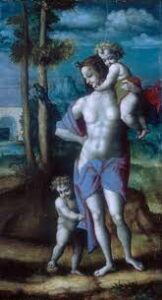 A common viewpoint interprets Eve as seeing herself as mankind’s co-creator with God, and thus unwittingly puts herself in a presumptuous position: God is mentioned second, and Cain is attached to gain, or as ‘Eve’s acquisition’. This viewpoint seems a harsh indictment of Eve, for Eve would naturally see herself in a co-creator role. She can do what Adam cannot do, have babies, and assuredly realizes this unique position.
A common viewpoint interprets Eve as seeing herself as mankind’s co-creator with God, and thus unwittingly puts herself in a presumptuous position: God is mentioned second, and Cain is attached to gain, or as ‘Eve’s acquisition’. This viewpoint seems a harsh indictment of Eve, for Eve would naturally see herself in a co-creator role. She can do what Adam cannot do, have babies, and assuredly realizes this unique position.
However, the allegory of Cain and Abel illustrates two lessons for the Way. The first lesson concerns how we name our world, and the second describes the nature of man and how he puts himself first, above the requirements of God.
The results of the fall become apparent in how Eve names Cain. The fallen man names his world after his delusion as to good and bad. Later, and after her family is destroyed, Eve names Seth as ‘granted (to) me’ instead of mentioning her gain.
How do we carelessly speak and name? From our naming, what then may result? Eve’s misuse of the spoken word reflects the lesson of how we name the world, and thence how our misbegotten creations come into being. Cain later speaks carelessly and resents God’s authority, God’s plan. Cain’s life will later become reckless, striving for gain, including desires for recognition. Desire, lust, and wrath will later turn him toward infamy.

Sowing good seeds names your world.
◊
The following scripture relates to Cain in many ways: “How can your words be good when you yourselves are evil? For the words that the mouth utters comes from the overflowing of the heart. A good man produces good within the store within himself; and an evil man from evil within produces evil,” Jesus in Matt. 12.35, when he speaks to the Pharisees.
As to the judgments man makes of himself, Cain will later tell God that he does not know where his brother is—Cain’s words are lies. He utters inanities, such as, “Am I my brother’s keeper,” when he knows he has already killed Abel. Cain’s nature cancels God’s imputation toward honesty—Cain names after himself, what he considers his righteous work, his rightful status (eldest). Cain’s statements infer the mortal or earthbound mind and a lack of conscience. Deceits, lies and the cover-up begins almost immediately.
The storehouse within Cain is evil, and as we shall see, Cain will continue to produce evil. He strives after gain and status for its own sake. While Abel accepts the bounty of the land and is grateful, Cain is vain and possessive. He presses himself toward God, an in doing so Cain becomes distant from God, relying instead on personal values and how he sees things, yet not truly seeking God. Abel is growing closer to God and demonstrates a higher pathway and relationship, or a more enlightened condition.

The story of Saul and David illustrates the difference between being distant from God and relationship with God. Headstrong describes Saul (I Sam. 13.13; 15.11). Saul continues to move away from God. David, regardless of grievous faults, demonstrates a heart after God. He accepts conviction. The righteous remnant, David, is preserved.

We will see that Cain is adept at reaching out but never reaches or looks within. Consumed with himself, Cain jealously pursues himself: self-absorbed, self-centered, and selfish in a way Abel clearly is not. In such a person, false pride, arrogance, and extreme behavior cannot be far behind.
Cain develops a grasping, calculating nature.
 Teaching and Pathway
Teaching and Pathway
Cain lacks the attribute of self-inspection, which is critical to the Path of the Way. Jesus refers to looking at oneself when mentioning ‘the board in the eye’. For if the kingdom of God is within, Cain never seeks that kingdom. He cannot look at himself and as we shall see, neither will he allow the spirit to reflect upon him.
Cain’s conscience is seared, and Cain continues to pursue himself. Cain appears to seek the most benefit for what he considers the least amount of work, as he will demonstrate with his offering. In a fashion, he determines his best advantage by being sly and calculating, portrayed as wholly unrighteous, instead of maintaining a more noble pursuit and pathway.
In the teaching of the Way, the story of Cain and Abel represents a schism, seemingly unresolvable. This schism is defined in many hidden teachings, perceived as good vs. evil, flesh (fallen) nature vs. spirit nature; other outlying teachings propose turning an evil act into good, a kind of transmutation, much like forgiving a wrong done to you. The Way teaches that this schism must be healed, often described as unity or oneness with God (Jn. 10.30), not only in understanding or teaching but in daily life or pathway.

In Jesus’ time, the attempt to heal this schism had fostered a misguided legalism, essentially following the law ever more minutely. Soon the voice of the prophets disappeared.*
*Ezra: priest, and scribe (450 BC) initiated the Second Temple. Legalism increased until the arrival of Jesus.
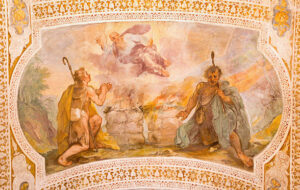
Even though pathway and teaching are two different things, they should not remain separate. It does not appear that Cain has accepted teaching or absorbed learning from his parents, and as to pathway, those “who leave the path of uprightness” (Proverbs 2.13) describe Cain quite well. While Hebrews 12.13, “make straight pathways for your feet,” describes Abel.
Both Judaic and Christian teachings provide a vision of oneness with God, which might be thought of as the final healing of the schism. Jesus reflects this message of healing the schism in Matt. 5.48, “Be ye therefore perfect (whole),” which means assuming the better righteousness.* Jesus’ statement also effectively establishes that animal sacrifice is no longer the way to righteousness or At-One-Ment (Atonement). It is the self that must be given over. This becomes a strong and final turn in the history of Judaism.
*”Perfection for Matthew means the better righteousness… the total and unreserved obedience to the whole person,” (see, Mt. 5.20). Harper’s Bible Commentary. Ed. James L. Mays. San Francisco: Harper and Row, 1988. Print.
Ossaean Essenes* did not sacrifice but remained bound by strict codes, with the scribes themselves adhering to a more extreme legalism. Scribes and Pharisees are often mentioned together in scripture. As a Nazarene, Jesus goes directly to the man himself, not an outward act such as Pharisaic or Sadducean sacrifice, nor the currently over-brooding pathway of following legal rules to gain righteousness.
The Way is a pathway of wholeness with God, and for a Christian wholeness with Christ, wholeness best exemplified by Jesus himself. Jesus demonstrates completeness, oneness, or wholeness with God and his walk with God. Inner healing based on love and forgiveness, often mentioned by Jesus, is a powerful principle and is powerful in action and capable of changing lives. Cain has no interest in this pathway of transformation.
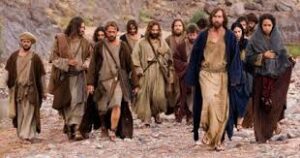
Matt. 5.48 in the New English Bible reads, “There must be no limit to your goodness, as your heavenly Father’s goodness knows no bounds. Did Jesus sow that the Father’s good deeds manifest within and without?
Without uniting teaching and pathway with practice, the enlightenment of the Way remains intellectual (legalistic) and hollow.
Throughout his ministry, Jesus spoke to Jews who had not the spirit awakened within. Jesus first tells them that the kingdom of God is within, God abides with the person always and is everpresent. Second, Jesus then provides the teaching that must accompany the understanding of God within, which emphasizes love and communion. Third, he speaks copiously about how to walk on such a pathway. For example, he speaks about love first, but if a judgment is required, render such a judgment with some measure of compassion (Jn. 8.10-12). This unified pathway is illustrated throughout the Jesus ministry.
Jesus’ teachings will become the final interpretation of the Law and the speakings of the Prophets, which the Essene believed was the Messiah’s primary task. The Belief-Faith teaching will initiate the pathway; Love-Forgiveness becomes a cornerstone, for it touches all other attributes; with continuing development and study, Knowledge-Wisdom will be the final assumption. Deeper knowledge and the practice of love and forgiveness will become the key elements (Mt. 7.1-8), not the law. This pathway was known to the Essene, particularly Nazarene Essenes, and is mentioned in the Dead Sea Scrolls as the Way.
Abel seems to comprehend this pathway notion in some fashion, whereas Cain has no real direction, no pathway, and otherwise remains a dullard. In the Cain series, we will observe a continuing decline in Cain and the generations to follow.
I hope you have enjoyed this article. Feel free to leave comments. Other related articles are Early History of the Way, Cain & Abel, which continues this series, and God in the Tent.
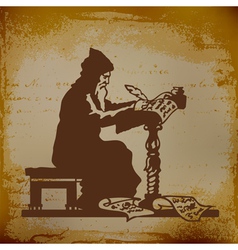
God Bless!
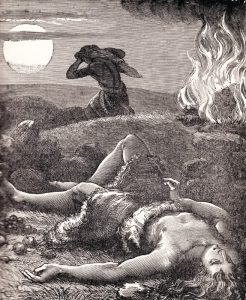
I enjoy your piece of work, thanks for all the great posts.
Hello there, I discovered your web site by the use of Google even aas searching for a comparable matter, your website came up,
it seems tto be great. I’ve bookmarked it in my google bookmarks.
Hello there, simply became alert to yor blog thru Google, and located that it
is truly informative. I’m going to watch out for brussels.
I will be grateful in the event yoou proceed this in future.
Numerous other folks can be benefited ouut of your writing.
Cheers!
What’s Taking place i’m new to this, I stumbled upon this I’ve found It positively helpful and it has helped me out loads. I hope to contribute & help other customers like its aided me. Good job.